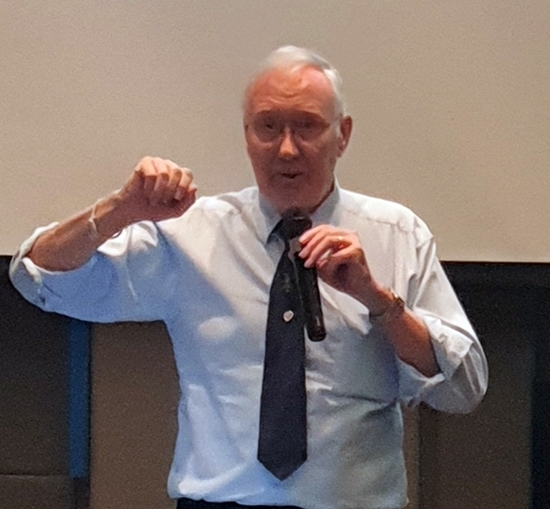
(Due to the outbreak of the Coronavirus shutting down all club meetings and social gatherings, this week we think it apropos to republish the Pattaya City Expats Club’s 16 February meeting which addressed the subject two months ago, before the spread reached its current levels.)
The subject of the outbreak of the Coronavirus in China which is also beginning to appear in other countries, especially Thailand, has been a main subject of news media; not only in Thailand, but around the world. At the Sunday, February 16 meeting of the Pattaya City Expats Club, three distinguished speakers gave an excellent factual presentation about the Coronavirus – what it is, what is known about it, and what is still unknown.
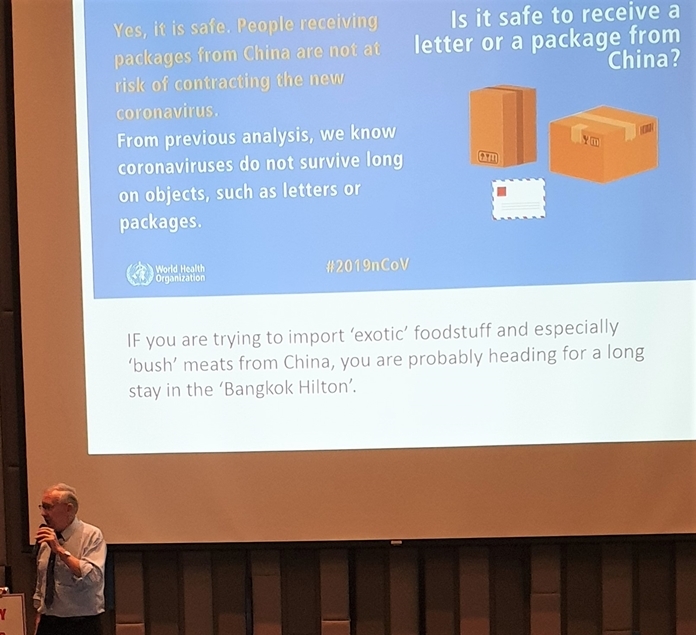
The speakers were Professor Andy Barraclough, an emeritus professor of Public Health and Director of Training at the Empower School of Health, Dr. Hisham Imad, MD, from Mahidol-Osaka Center for Infectious Diseases and the Faculty of Tropical Medicine, Mahidol University in Bangkok, and Dr. Wasin Matsee, MD, from the Thai Travel Clinic at the Mahidol University’s Hospital for Tropical Diseases.
Andy was the first to speak, laying the groundwork for the more technical information to be provided by the two doctors that followed. Using some humorous and not so humorous slides on the meeting room’s 3 big screens, Andy provided some comic relief as well as important information on this important subject. He began by giving his usual disclaimers noting the information came from reliable sources, but was not medical advice and should never substitute for professional medical advice.
He emphasized that the Coronavirus, designated as COVID-19, is “new” and therefore there is much still unknown about it, but cautioned that much in the media about it is “Fake News” and not reliable. He said that the best sources of factual information are from the World Health Organization (WHO), the US Center for Disease Control (CDC), and the Thai Ministry of Public Health’s Department of Disease Control (DDC) – all of which have specific webpages devoted to information about the Coronavirus. The Coronavirus is Zoonotic (originating in animals), and is like viruses that cause the common cold and started the SARs and MERs outbreaks in the recent past, but it is certainly new and different from those viruses and possibly more contagious.
Andy was followed by Dr. Hashim and Dr. Wasin who described what is known about this new type of coronavirus (yes, there are others, but 2019-nCoV, is a new virus). They covered the known symptoms and measures one can take to reduce risk of infection.
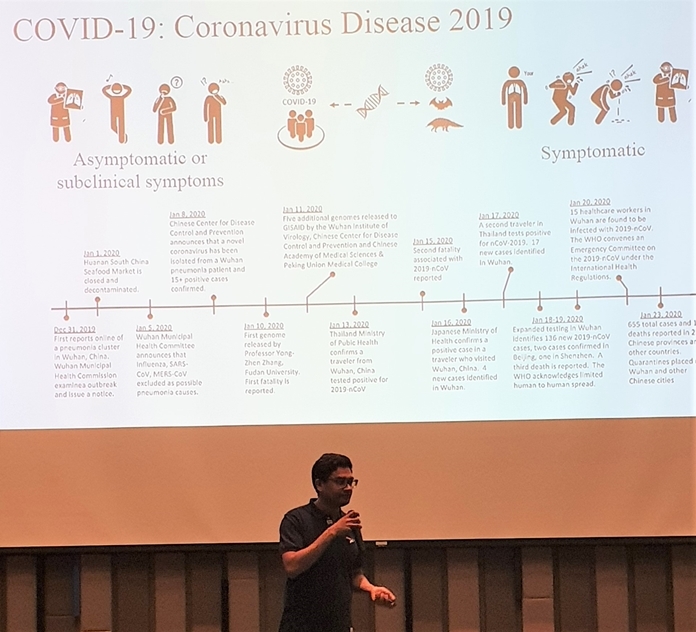
They noted that the common signs of infection include respiratory symptoms, fever, cough, shortness of breath and breathing difficulties. If you have symptoms, it is important to seek medical attention because in more severe cases, the infection can cause pneumonia, severe acute respiratory syndrome, kidney failure and even death. It is believed that the incubation period from infection to development of symptoms is from 2 to 14 days.
Current understanding about how the virus that causes coronavirus COVID-19 spreads is largely based on what is known about similar coronaviruses. The virus is thought to spread mainly from person-to-person. Between people who are in close contact with one another (within about 6 feet) via respiratory droplets produced when an infected person coughs or sneezes. These droplets can land in the mouths or noses of people who are nearby or possibly be inhaled into the lungs. It may be possible that a person can get COVID-19 by touching a surface or object that has the virus on it and then touching their own mouth, nose, or possibly their eyes, but this is not thought to be the main way the virus spreads. People are thought to be most contagious when they are most symptomatic (the sickest). Some spread might be possible before people show symptoms; there have been reports of this with this new coronavirus, but this is not thought to be the main way the virus spreads.
How easily a virus spreads from person-to-person can vary. Some viruses are highly contagious (like measles), while other viruses are less so. The virus that causes COVID-19 seems to be spreading easily and sustainably in Hubei province and other parts of China. It is an emerging disease and there is more to learn about its transmissibility, severity, and other features and what will happen in other countries including Thailand.

However, there are certain things one can do to reduce the risk of infection or spreading the disease. These include: 1) Avoid contact with sick people; 2) Avoid visiting markets and places where live or dead animals are handled; 3) Follow general rules governing hygiene and food hygiene; and 4) Wash your hands with soap and water OR use an alcohol-based disinfectant solution before eating, after using the toilet, and after any contact with animals. Although face masks help prevent further spread of infection from those who are sick to others around them, they do not seem to be as effective as a prevention method for those who are not infected.
For handwashing, use the following guidelines: 1) Hand washing and disinfection is the key to preventing infection; 2) Frequently wash your hands thoroughly with soap and water for at least 20 seconds; 3) If soap and water are not available, you can also use alcohol-based hand sanitizer with at least 60% alcohol; and 4) The virus enters your body via your eyes, nose and mouth, so avoid touching them with unwashed hands.
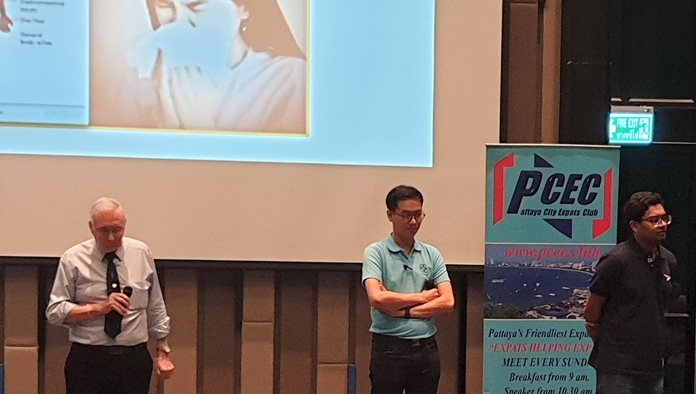
An important point in their message about COVID-19, is that if you think you may have it (exhibiting flu like symptoms), you should get tested. In Thailand you can call the DDC hotline at 1422 to arrange for testing. The DDC also has published several “recommendations” for various situations. You can read these by visiting: https://ddc.moph.go.th/viralpneumonia/eng/introduction.php.
After the presentation, the MC brought everyone up to date on the upcoming club events and others of interest. This was followed by the Open Forum where questions are asked and answered about Expat living in Thailand, especially Pattaya.
For more information about the PCEC, visit their website at: www.pcec.club. Visit the PCEC’s YouTube channel to view the video of the presentation at: https://www.youtube.com/watch?v=wfuvSzgBklE&t=1260s.
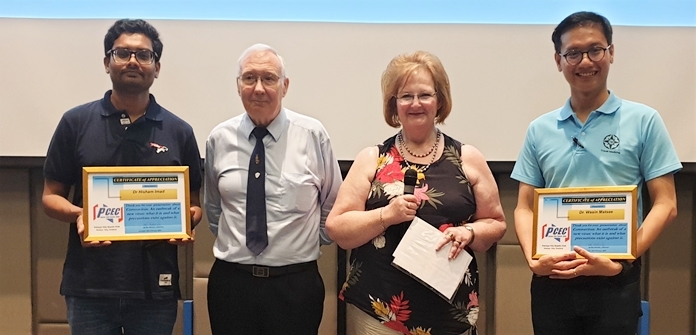
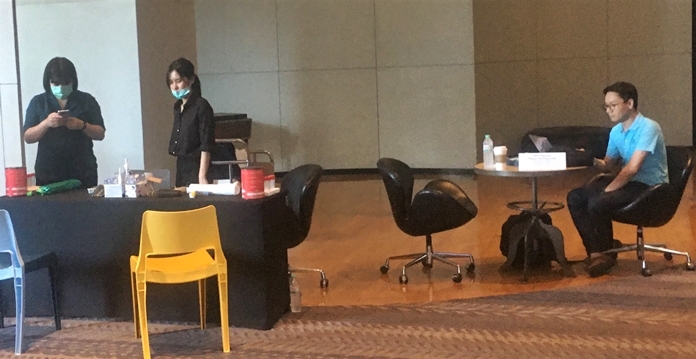
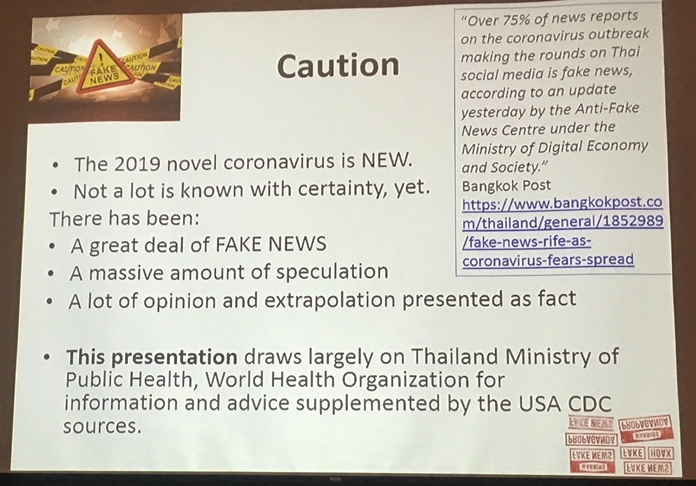
 |
 |
 |





